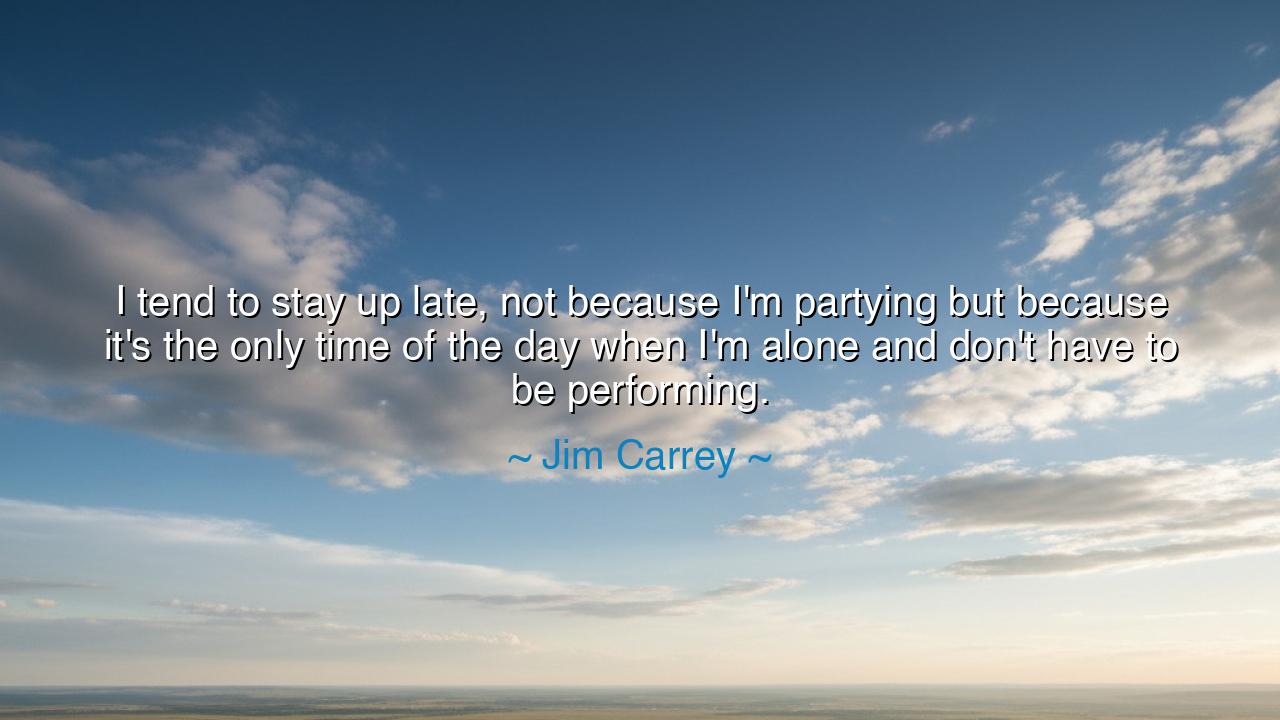
I tend to stay up late, not because I'm partying but because it's
I tend to stay up late, not because I'm partying but because it's the only time of the day when I'm alone and don't have to be performing.






"I tend to stay up late, not because I'm partying but because it's the only time of the day when I'm alone and don't have to be performing." These words from the great Jim Carrey reveal a profound truth about the human condition—the eternal struggle between identity and the demands of the world. In the daylight, we wear our masks, we fulfill our roles, and we perform. But it is in the stillness of the night that we shed the facade and allow ourselves to rest, to be free from the expectations of others. For in the solitude of the dark hours, the soul finds peace.
From the earliest of times, humans have wrestled with the tension between public and private self. The ancient philosophers spoke often of this internal battle. Socrates would urge his disciples to "Know thyself," but how could one truly know themselves when the world demanded so much of them? In their day, the need for personal reflection was essential for wisdom, yet it was equally difficult to carve out time for such moments amidst the constant clamor of society. Carrey’s words resonate with a timeless truth: the hours of solitude, the moments when we are unobserved, are often when we are most honest with ourselves.
Consider the story of Leonardo da Vinci, the renowned artist and thinker, who would work late into the night. In his silence, free from the pressures of his patrons or the public eye, he could explore his thoughts, creating masterpieces that would echo through the ages. Da Vinci’s genius, like Carrey’s, was nurtured not in the rush of the daylight hours, but in the stillness of the night. There, in his solitude, he could find clarity, away from the expectations of others, where his creative spirit could truly soar.
Yet, this notion is not confined to the world of artists or thinkers. The common person feels it too. The pressure to perform, to meet the demands of work, family, or society, can leave the soul feeling weary. And in that weariness, we often forget who we truly are. Carrey’s confession is a reminder that, while we may be required to play roles in the daytime, it is within ourselves that we find our truest expression. The late hours serve not as an escape from responsibilities, but as a sanctuary where the authentic self is allowed to breathe.
In the story of Mahatma Gandhi, we find a man who, like Carrey, often found peace in solitude. Gandhi was a leader and a revolutionary, and the world demanded much from him. Yet, it was in his moments of quiet reflection, whether in the solitude of his simple ashram or in the silence of meditation, that he found the strength to lead with compassion and conviction. Gandhi understood that to give to the world, one must first have the strength and clarity that comes from being alone with one's thoughts. His commitment to truth and nonviolence was not forged in the noise of public life, but in the stillness of personal solitude.
From the silence of the night, we learn to hear our own truth. It is a truth not shaped by the world’s demands or by the expectations of others, but one that arises from deep within, from the core of our being. When Carrey speaks of staying up late, he is not merely talking about avoiding the noise of the day; he is seeking a deeper connection with the self, a time when he does not need to perform but can simply be. The quiet hours become a sacred time for self-discovery, where we listen not to the judgments of others, but to the whisperings of our own heart.
The lesson here is clear: in the busyness of life, we must make time for solitude. It is not an indulgence or a luxury, but a necessity for the well-being of the soul. True wisdom and strength come not from the applause of the crowd or the performance of duties, but from moments of quiet reflection. We must embrace the night, not as a time to escape our responsibilities, but as a time to reconnect with our deepest selves. Only then can we find the clarity and peace necessary to face the demands of the world. In solitude, we find not isolation, but empowerment—the strength to be our truest selves, even in the light of day.
So let us follow Carrey’s example and seek those moments of quiet, whether in the late hours or in the corners of our busy lives. For it is only when we allow ourselves to be alone and unburdened that we can hear the call of our own hearts and live lives that are truly our own. Perform when necessary, but always return to solitude to remember who you truly are. There, in the quiet, you will find your strength.






AAdministratorAdministrator
Welcome, honored guests. Please leave a comment, we will respond soon